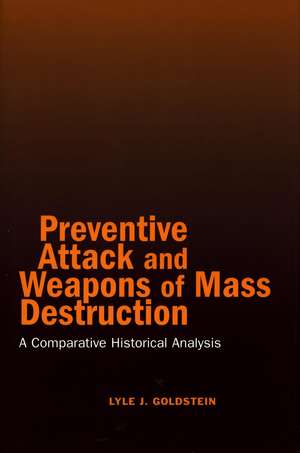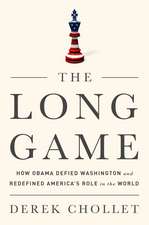Preventive Attack and Weapons of Mass Destruction: A Comparative Historical Analysis
Autor Lyle Goldsteinen Limba Engleză Hardback – 19 dec 2005
The controversial Bush doctrine of preemptive war is often described as revolutionary. In fact, as this comparative study of rivalries involving weapons of mass destruction (WMD) shows, notions of preventive and preemptive war have long been closely tied to such weapons. In this study, a wealth of historical data is analyzed to address the fundamental question that WMD proliferation raises for U.S. defense policy: will the projection of U.S. power be deterred by nascent WMD arsenals in the hands of rogue states?
This wide-ranging comparison yields the conclusion that small WMD arsenals do not have the deterrent effects often attributed to them by scholars and analysts. These theorists ignore history’s close calls, an oversight we share at our peril.
This wide-ranging comparison yields the conclusion that small WMD arsenals do not have the deterrent effects often attributed to them by scholars and analysts. These theorists ignore history’s close calls, an oversight we share at our peril.
Preț: 447.08 lei
Preț vechi: 551.95 lei
-19% Nou
Puncte Express: 671
Preț estimativ în valută:
85.56€ • 92.90$ • 71.87£
85.56€ • 92.90$ • 71.87£
Carte tipărită la comandă
Livrare economică 23 aprilie-07 mai
Preluare comenzi: 021 569.72.76
Specificații
ISBN-13: 9780804750264
ISBN-10: 0804750262
Pagini: 280
Dimensiuni: 152 x 229 x 20 mm
Greutate: 0.49 kg
Ediția:1
Editura: Stanford University Press
Colecția Stanford University Press
ISBN-10: 0804750262
Pagini: 280
Dimensiuni: 152 x 229 x 20 mm
Greutate: 0.49 kg
Ediția:1
Editura: Stanford University Press
Colecția Stanford University Press
Recenzii
"Through his keen comparison of numerous cases and his empirical valdation of previously unproven hypotheses, Goldstein has made a valuable addition to the literature on weapons of mass destruction, national security, and international conflict."—Books & Culture
"Readers who are either interested in or who must grapple with the issues raised here should read this book before making up their minds on any course of action."—Parameters
Notă biografică
Lyle J. Goldstein is Associate Professor of Strategic Studies and Vice-Chairman of the Eurasia Studies Group at the U.S. Naval War College in Newport, RI.
Descriere
This comprehensive survey of weapons of mass destruction (WMD) rivalries places the Bush Doctrine of preemption in historical context, arguing that instability fueled by first-strike incentives is an inherent byproduct of WMD proliferation.













